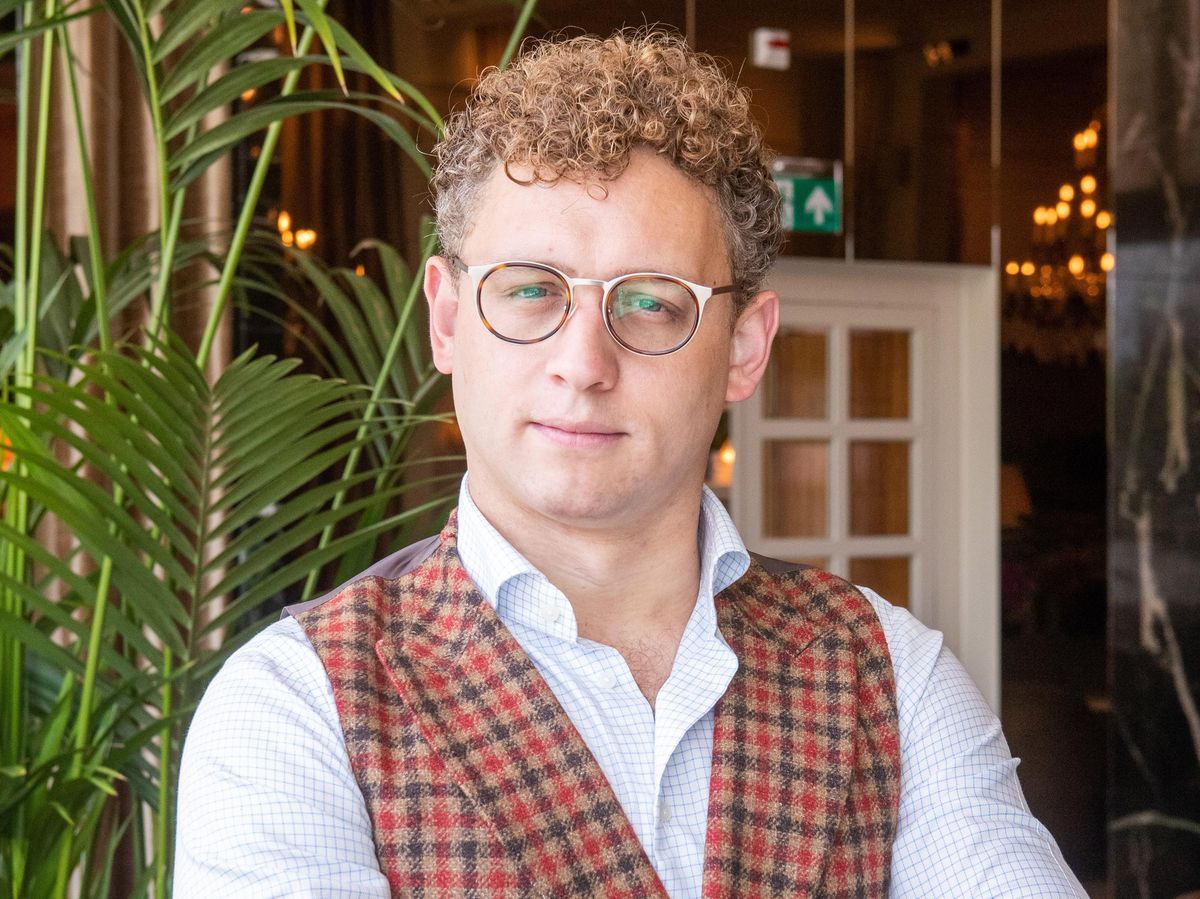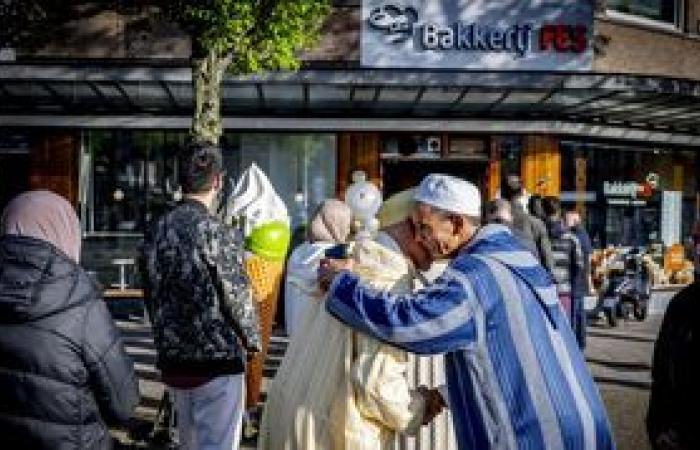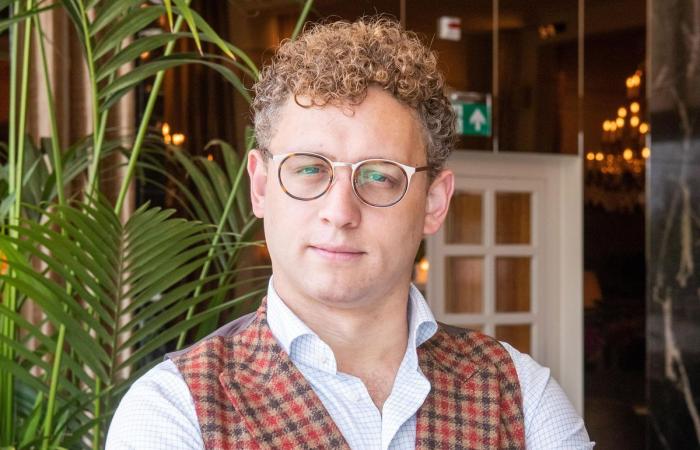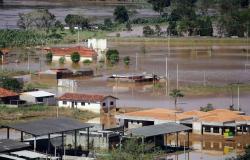/From our special correspondent in the Netherlands/
Few people know the Dutch anti-European radical Geert Wilders as well as he does. The thirty-seven-year-old historian, writer and publicist Geerten Waling is finishing a book about him, the greater part of which was written by the late political scientist Meindert Fennema.
Geert Wilders is currently one of the most powerful politicians in The Hague, the de facto capital of the Netherlands. His Party for Freedom (PVV) won the parliamentary elections for the first time in November. Although she has so far failed to form a government, polls indicate that she will maintain her popularity in the European Parliament elections in June.
In an interview for Seznam Správy, which took place in the elegant surroundings of a cafe at Amsterdam’s train station, Waling describes how Wilders is different from other nationalist leaders, how his voters perceive him and why he has stopped talking about leaving the European Union.
“The Party for Freedom (PVV) is no longer the only anti-Islamic party, but it responds to social problems, and especially the working class feels that Wilders sees their problems and tries to represent them. Even some Muslims feel that migration has gone too far and that the new arrivals are taking away their jobs and housing,” Waling describes the reasons for Wilders’ success.
Try to describe the atmosphere in the Netherlands before the European elections. Is it different than before last year’s parliamentary elections, which were won by Geert Wilders’ Party for Freedom?
Yes, she has changed. In the last European elections, Wilders was not successful. He won only one seat, but later lost it because his MP switched to another right-wing party, the Forum for Democracy. But now in November he won 37 parliamentary seats in the Dutch parliament, that is almost a quarter of the seats for a party that practically does not exist, he is its only member.
Dutch Trump
Photo: Jeroen Meuwsen Photography, Shutterstock.com
Geert Wilders.
Sixty-year-old Geert Wilders was born in 1963 in the town of Venlo near the German border, his father was the director of a printing house.
He started his working career in the social and health insurance industry, this area also brought him into politics. In 1997 he was elected to the Utrecht city council and a year later to parliament for the first time.
Show all
It was a big shock, although Wilders is also now the longest serving member of parliament, soon to be 26 years old. He should be the most famous politician, but people don’t really know much about him.
After the last election, there is a lot of fear among the left-wing parties, what will happen now. I think this is very naive, even some of my colleagues from the ranks of journalists completely neglected Wilders’ potential. They were convinced that he could win a maximum of 15 or twenty seats in parliament and that he could work regardless. But that won’t work anymore. It was a wake-up call that will be reflected again in the European elections. Geert Wilders is viable and can change something in Europe too.
Can you compare Wilders with other anti-European leaders, be it French politician Marine Le Pen or Hungarian Prime Minister Viktor Orbán?
Geert Wilders is much more liberal than most similar parties, he is not a Christian conservative, but he is more anti-Islamic and very anti-migration. But he is also a democrat, he loves parliament, and when he received an award for 25 years of service in parliament last year, it moved him to tears. At that time, he received a silver statuette of a carriage from the head of the parliament.
On the one hand, he is against the establishment, but on the other hand, he is a supporter of parliamentary democracy – in this he differs from many far-right politicians, who often want to abolish parliament. In it, Wilders wants to represent people whose voices are not heard.
Europe before the elections
Seznam Zpráv correspondents travel to European countries before the June elections to the European Parliament. Milan Rokos is already preparing a series of texts from the Netherlands, Filip Harzer will head to Hungary this week. You can also look forward to reports and interviews from France, Austria and Germany.
So you don’t seem to consider him to be any danger to democracy in your country…
No. There has been a lot of talk about this in the Netherlands, but I think it is a complete mistake. Nobody loves Dutch parliamentary democracy as much as Geert Wilders, but he is a threat to some aspects of the rule of law, to the liberal democracy with human rights that we have here, to the constitution and international treaties.
Many of his ideas are in conflict with basic human rights – for example, he wants to close mosques, Islamic schools, ban the Koran… It can be said that this is in conflict with freedom of religion or freedom of expression or assembly. This is very problematic. However, he never wanted to change the Parliament, as well as the electoral law, nor to cheat in the elections in any way.
But now he cannot rule by himself because he does not have enough seats, so he is negotiating with three other parties. He has now put all his ideas on ice, and has also given up the position of prime minister. After all, he knew that he could not be prime minister, because he was not supported by a normal party, the PVV was more of a sect. So he must first create a proper party, but in the twenty years since he left the Liberal Party (VVD) he has shown no interest in doing so.
To people who are concerned about the current negotiations, I would say: The very fact that Wilders has put his unconstitutional ideas on ice is a testament to the strong rule of law in the Netherlands.
You mentioned his anti-Islamic mindset. A Moroccan living here told me that many Muslims also vote for Wilders. How does it go together?
Wilders Party for Freedom is not racist, there are a lot of Indonesians, people from Surinam, but also Muslims, Arabs, Turks and Iranians who really like Wilders. The PVV is no longer the only anti-Islamic party, but it responds to social problems, and especially the working class feels that Wilders sees their problems and tries to represent them. Even some Muslims feel that the migration has gone too far and that the new arrivals are taking away their jobs and housing – and housing is the big problem now.
There are no apartments, refugees live on boats
Read a report from Rotterdam, the Netherlands, which is dealing with migration – a topic that will often decide the outcome of the European elections.
Moderate Muslims then see that Wahhabism and Salafism have entered some mosques and money is flowing in from the Persian Gulf, and Wilders is attacking that.
In my book, I also quote an American journalist who said after Donald Trump won the presidential election that journalists take Trump literally but not seriously, while his voters take him seriously but not literally. And it’s the same with Wilders. His constituents take him seriously, but not literally – when he says he will close all mosques and ban the Koran, they take it as a metaphor. But journalists protest that it is against human rights. People also didn’t think that Trump would close the entire border with Mexico, but that he would just try. And people who feel abandoned and neglected by the government will appreciate that.
In the last twenty years, Wilders has lived under the strictest protection against terrorism. When he goes somewhere, he has around twelve security guards around him, so he has a very isolated personal life. Even so, he is a politician whom voters feel understands them.
How would you characterize his voters?
It is mainly the working class with less education who live in the suburbs rather than the big cities. These are often people who either vote for Wilders or don’t vote at all. Because a gap has formed between the established parties and these people, no other party represents them.
In European politics, Wilders advocated nexit, i.e. the Dutch exit from the EU. But now they don’t talk about him, do they?
Yes, about two weeks ago he suddenly started talking about reforming the European Union instead of leaving. He gave up the idea of nexit, as well as other things, including the post of prime minister. Despite this, he remains popular with his constituents. Like I said, they don’t take him literally.
Who is Geerten Waling

Photo: Leo Vogelzang
Geerten Waling
- Historian, studied at the University of Leiden.
- Since 2016, he has been writing columns for the newspaper Elsevier Weekblad (EW), where he has also been working as an editor since 2023.
- He writes books on democracy and lectures on historical and political topics.
Did he give up nexit more in an attempt to accommodate potential coalition partners, or rather because the Dutch are very pro-European?
The former applies, on the contrary, his voters are very anti-European. If I psychologize a bit, I would say that Geert Wilders always wanted to become part of the establishment. He comes from the province of Limburg, which is a bit of a neglected part of the country. Catholics live there, people have strange accents, Limburg is considered a backyard to the Protestant north and the center of the country in Amsterdam, Rotterdam and The Hague. This already made him feel disadvantaged, he also does not have a university degree, he used to be a member of the VVD, but he did not feel respected there. When Mark Rutte’s first government took office, he and his PVV were de facto part of it – although he didn’t have ministers there, he tolerated it and thus helped it survive.
I think he now dreamed of being prime minister, but he can already see that it won’t be possible. If he became a minister, it would be difficult also because he would have to leave the parliament – in our country you cannot sit in the government and in the parliament – and leave your deputies there alone.
How big an election issue is the war in Ukraine itself for the Netherlands and Wilders?
I think not much, because there is a general consensus on this in society. Apart from the smaller Forum for Democracy party, which is clearly pro-Russian, Russia has no friends here. Wilders was against sending weapons to Ukraine, but he has also put it on ice now, it is not a major issue for him. After all, recently your secret services published a report about politicians paid by Russia, there were also two Dutchmen from the Forum for Democracy. That party is made up of lunatics, who I don’t think will win a single seat in the European Parliament elections.
It will be interesting to see if Wilders can mobilize voters in June, because they are not interested in the European Union and consider these elections a waste of time.
Some politicians fighting against the establishment rather pretend their views and start parties as a business project, they simply saw a gap in the market. So that’s not the case with Wilders, is it?
No, Wilders is different. Going back to his opposition to Islam, he really means it. He himself does not have his own personal life for security reasons. Although he leads the Party for Freedom, he is one of the least free people in the Netherlands. He can’t go anywhere without security, he can’t even drive a car. He is therefore something of a messiah for his constituents – he suffers so that they may be free. But they themselves would never admit it.
Wilders is definitely not doing it for the money – if he had built the party and was not its only member, he would have received much more money from the state than the PVV is receiving now. Maybe there are some such people looking for an opportunity around her, but Wilders is not.
Did the murder of populist politician Pim Fortuyn in 2002 affect his beliefs?
Yes, but even more so the death of Theo van Gogh. This was the filmmaker who was murdered by a Dutch-Moroccan jihadist in 2004. Van Gogh was making a film with Ayan Hirsi Ali, a Somali-Dutch politician, a close colleague and ally of Wilders. He did it with Geert Wilders. The terrorist killed van Gogh because she was too guarded.
Since then, Wilders has had police protection, it will be twenty years already, and Wilders has been feeling the consequences of Theo van Gogh’s murder all this time. He regularly receives death threats and fatwas have been issued against him. A normal life will probably never be lived again. And yes, for his voters, the death of Pim Fortuyn was a turning point, since then many of them started voting anti-Islam.








